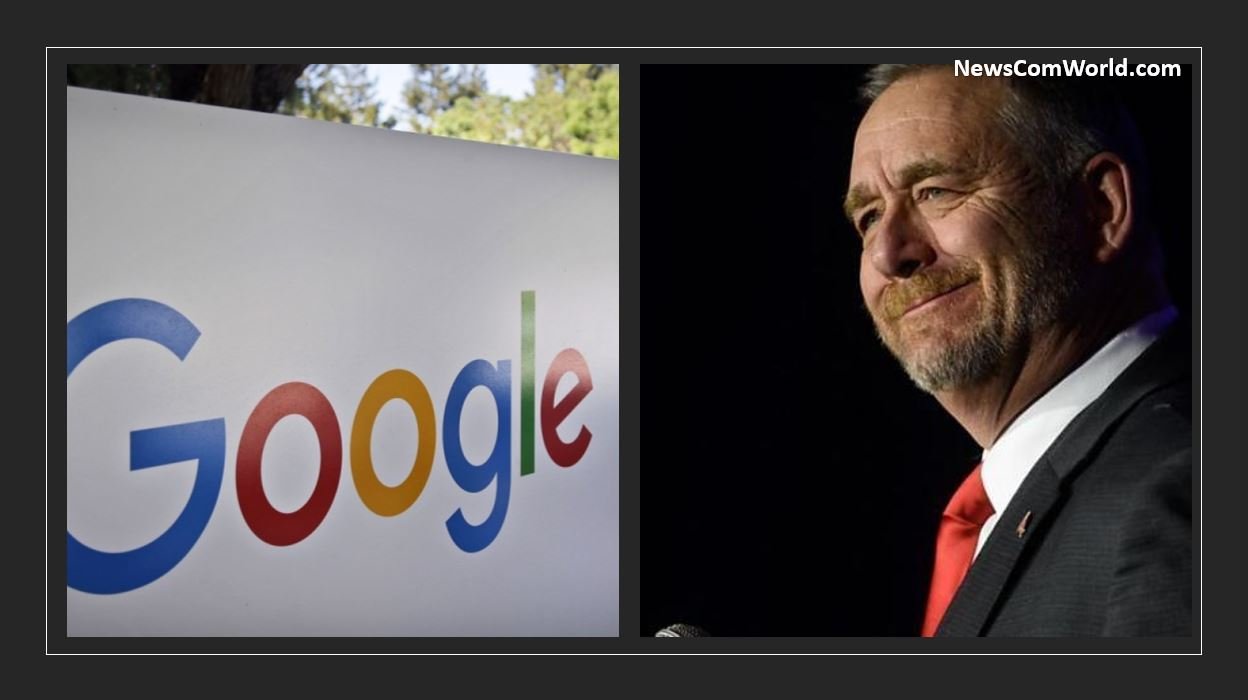Ohio Attorney General Dave Yost filed a lawsuit against Google, asking a court to declare Alphabet’s Google be declared and regulated as public utility.
Ohio Attorney General Dave Yost filed a lawsuit this week asked a court on Tuesday to declare Alphabet’s Google a public utility in the state due to its internet search dominance, a step the state’s Republican attorney general said would forbid the search and advertising giant from giving preferential treatment to its own products.

Google’s critics have said for years that it should be treated like a public utility.
The complaint does not seek monetary damages, . It does, however, take issue with the fact that the company is able to feature its own products on its results pages.
The lawsuit filed by Ohio seeks no monetary damages, nor does it seek to address whether Google’s dominance in the market is good or bad, but asks the court to require Google to refrain from prioritizing its own products.
“As a result of Google’s self-preferencing Results-page architecture, nearly two-thirds of all Google searches in 2020 were completed without the user leaving Google owned platforms,” the lawsuit says.
In addition to classifying the company as a public utility, Yost is seeking injunctive relief that would prevent Google from engaging in self-preferencing behaviors among its search results.
Suggested Article Nigeria Suspends Twitter Indefinitely After A Tweet of The President of A Sovereign Country Was Deleted And His Account Suspended For 12 Hours.
“Ohio has an interest in ensuring that Google, its users, and the entities whose information Google carries are aware that Google Search is a common carrier under Ohio law,” the complaint reads. “Ohio also has an interest in ensuring that as a common carrier Google Search does not unfairly discriminate against third party websites; that Google carries all responsive search results on an equal basis; and that it provides the public with ready access to organic search results that the Google Search algorithms produce.”
“When you own the railroad or the electric company or the cellphone tower, you have to treat everyone the same and give everybody access,” Attorney General Dave Yost said in a statement.
Google has a 91% share of search world-wide, according to StatCounter, a web analytics firm. Google’s decades-old lead in search has helped it amass queries that allow it to improve its service and make it difficult for rivals’ offerings— Microsoft Corp.’s Bing or DuckDuckGo—to compete.
For example, the search engine has appeared to surface videos from its online-video service, YouTube, over similar clips from Facebook Inc. The company also has faced allegations that it lifts content such as song lyrics and weather from other websites and features it as an answer to queries in so-called knowledge boxes rather than directing users to sites that are the source of that information.
Suggested Article Laws Enacted By The Indian Parliament Must Be Followed Irrespective Of Twitter’s Own Rules And Guidelines : India Tells Twitter
Google has previously said that it doesn’t give preference to YouTube and that it doesn’t scrape other websites for useful information.
In 2020, two-thirds of Google searches ended without a click, according to analysis of 5.1 trillion queries by SimilarWeb, a digital measurement service. SparkToro Chief Executive Rand Fishkin, who worked with SimilarWeb on its research, said that practice keeps users on Google’s site, where they are served ads, and deprives other websites of traffic and ad dollars.
In a statement alongside a Supreme Court order in April, Justice Clarence Thomas suggested that he believed regulating tech platforms as utilities had merit.
That case involved former President Donald Trump’s practice in office of blocking certain individuals from following his Twitter account. The court dismissed the case as moot, given that Mr. Trump was no longer in office, but Justice Thomas suggested that social-media networks such as Twitter, Google and other tech companies could be regulated to limit their power over who speaks and what is said over their platforms.
Related Article Twitter Banned Trump’s Twitter Handle. Google and Apple to Suspend Parler from App Store
The Ohio case, however, isn’t focused on speech but rather on Google’s tendency to surface search results that direct users to its own products rather than rival services.
Mr. Yost argues Google’s practices prevent Ohioans from making informed choices by depriving them complete access to all available information. For example, a search for a flight might direct a user to Google Flights rather than surface the travel offerings of services such as Orbitz and Travelocity.
The lawsuit, which estimates that Google is used for nearly 90% of internet searches and has 95% of the search share on mobile devices, accuses Google of responding to certain search requests in a way that prioritizes Google’s products even if other responses would give better answers.
“Google uses its dominance of internet search to steer Ohioans to Google’s own products – that’s discriminatory and anti-competitive,” Yost said.
Ohio also joined 37 others in a case led by Colorado’s attorney general that is suing Google in U.S. District Court for the District of Columbia for anticompetitive conduct under the Sherman Act.
Related Article Curtailing Social Media Companies like Facebook and Twitter’s Anarchy Projected as A Violation of North American trade deal : Tech Tyranny
A Google spokesperson said the company would defend itself in court.
“Google Search is designed to provide people with the most relevant and helpful results. … Ohioans simply don’t want the government to run Google like a gas or electric company. This lawsuit has no basis in fact or law,” the spokesperson’s statement said.
“It often features Google products and services in attractive formats at the top of the Results page above organic search results. Additionally, Google often presents Google products in enhanced ways in the search results that are designed to capture more clicks,” the lawsuit states.
The lawsuit was filed in the common pleas court, Delaware County, in Ohio. It is one of several filed by the federal government and state attorneys general against big tech platforms Google and Facebook.
Related Article Australia or Facebook – Who Should Decide Laws for Australia?
The case adds to the legal woes confronting the Alphabet Inc. subsidiary, which also faces antitrust lawsuits from the Justice Department and a separate consortium of states led by Colorado and Texas. The company is contending with cases in countries around the world where its dominance as a search provider has sparked a push by regulators to corral its power.
Earlier Alphabet Inc.’s Google agreed to pay French regulators a fine of nearly $270 million, settling one of the first antitrust cases globally that allege the tech company abused its leading role in the digital advertising sector.
Suggested Article Attack On The First Amendment Right : Facebook Bans Committee to Defend Trump From Running Ads Until November 1 — Two Days Before Election
As part of the case, the French competition authority alleged that the company’s advertising server—historically known as DoubleClick for Publishers and used by most large online publishers to put ad space up for sale—gave Google’s online ad auction house, AdX, an advantage in advertising auctions, in part by providing information about rival bids.
The authority also alleged other forms of self-preferencing between Google’s advertising-technology tools, including AdX’s offering better interoperability options to DoubleClick for Publishers.
“These practices were particularly serious because of their powerful impact on online advertising intermediaries,” said Isabelle de Silva, the head of the French competition authority, in a press conference Monday.
France’s competition authority said it had also accepted a series of proposed commitments Google made to settle the case, including promises to make it easier for competitors to use its online-ad tools. The Wall Street Journal first reported the proposed settlement last month. The regulator said Google has made five general commitments as part of the settlement. They include no longer allowing AdX to use competitors’ bids to optimize its own bids, and giving rival ad servers equal access to data about advertising auctions, the regulator said. An independent observer will be responsible for monitoring Google’s compliance and will report back to French regulators.
While Google’s commitments are binding only in France, they will become a template for how the company could resolve similar complaints from publishers and advertising-technology rivals elsewhere—potentially changing how Google operates its system around the world. Gomri said Google would test its changes “over the coming months before rolling them out more broadly, including some globally.”
Related Article An Open Letter by an Indian over Twitter’s Tussle with Indian Government
The settlement is part of a broader wave of antitrust enforcement against big technology companies on both sides of the Atlantic. Last week, the European Union and the U.K. each said they were opening formal antitrust investigations into Facebook Inc.’s classified-ads feature, dubbed Marketplace. The EU has also filed antitrust charges against Apple Inc. and Amazon.com Inc. The companies deny wrongdoing and dispute the charges.
A group of U.S. states led by Texas sued Google in December 2020 for allegedly operating a digital-advertising monopoly. The U.K. competition authority began an investigation in January into whether Google’s plan to remove user-tracking tools called cookies from its Chrome browser could hurt competition in the online ad industry. The European Commission, the EU’s top antitrust regulator, has also been investigating Google’s advertising business.
Points to Ponder
Should Tech Giants be allowed to grow bigger enough to interfere in the politics and internal affairs of sovereign nations worldwide by way of regulating what content and political ideology tech giants support?
You can see Liberal/Leftist content promoted on all social media platforms. Have you ever seen conservative, RW or Nationalist content promoted by these Tech Giants?
Follow us at:-
Twitter Handle: @newscomworld
Twitter Handle for Hindi : @NewsWorldHindi
Telegram Handle : @NewsComWorldCom
Koo Handle : @NewsComWorld
Parler Handle: @NewsComWorld
Tooter Handle: @NewsComWorld
YouTube Channel https://www.youtube.com/channel/UCnKJQ3gFsRVWpvdjnntQoAA
Facebook Page https://www.facebook.com/NewsComWorld
1,424 total views








